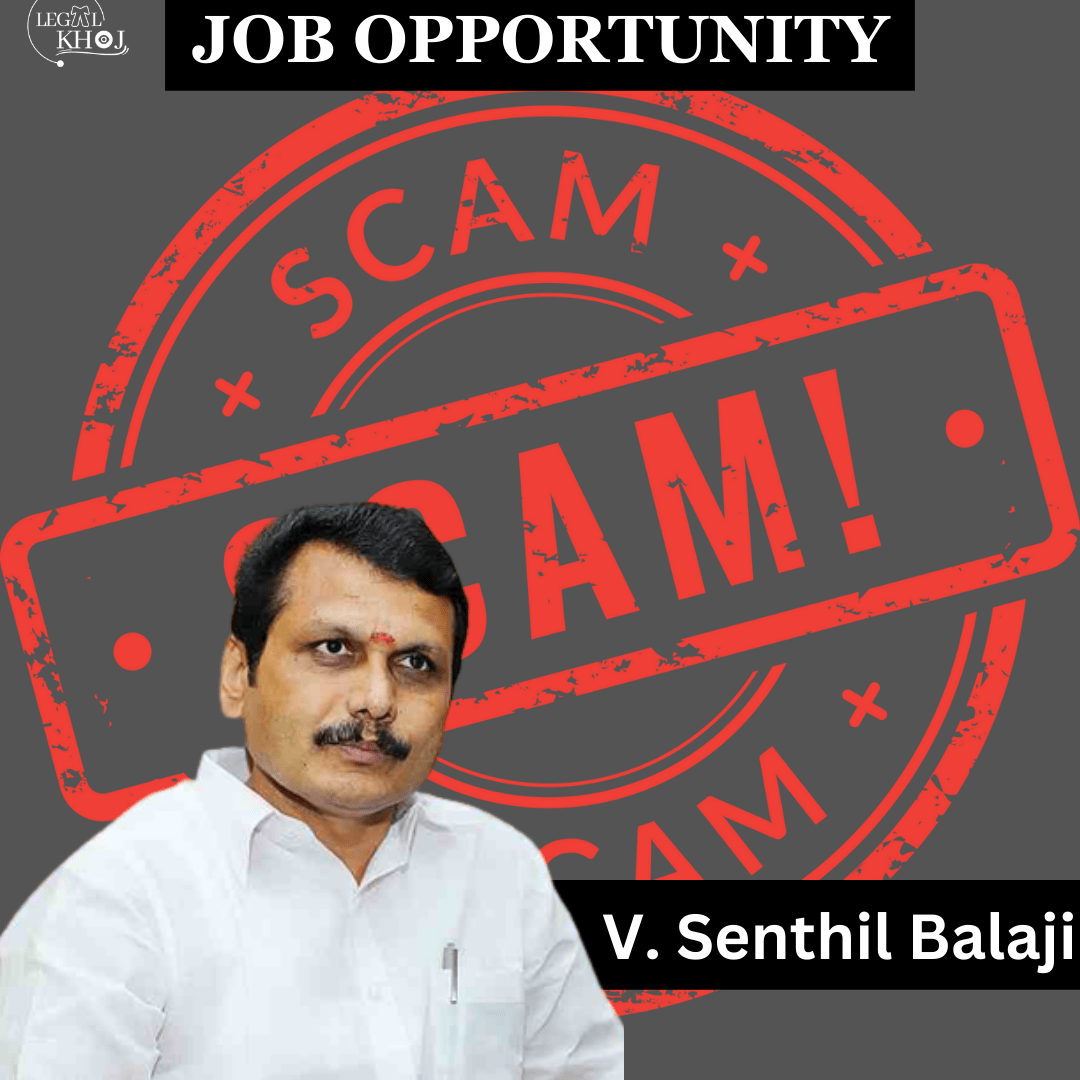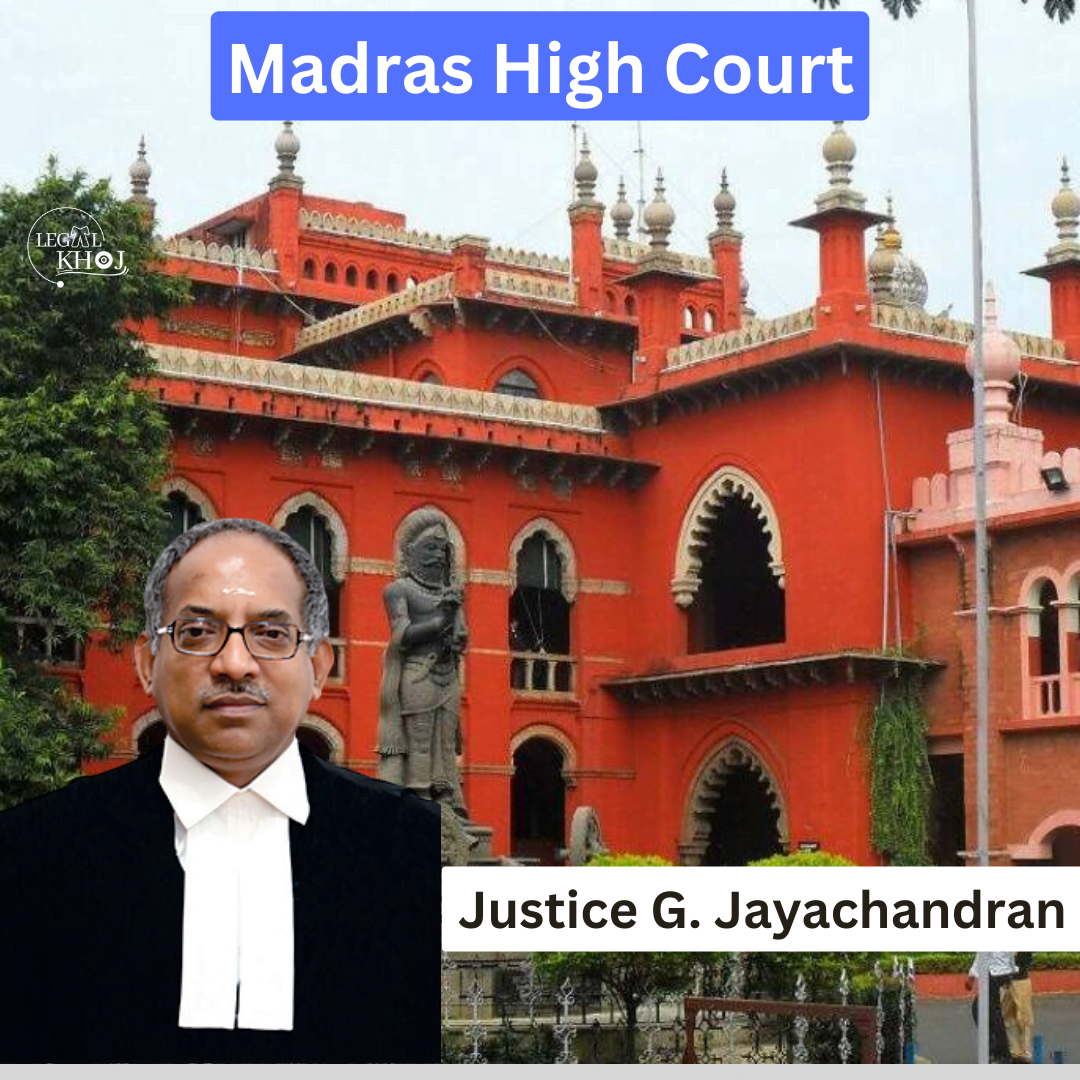The matter of V. Senthil Balaji’s tenure as a Cabinet Minister following his arrest was deferred to Chief Minister MK Stalin by the Madras High Court. Balaji, currently in judicial custody, holds the position of Minister without Portfolio, and it is now the Chief Minister’s prerogative to decide on his continuation in the role.
Background:- Madras High Court [Cash-for-job Scam] case

In a recent legal development, V. Senthil Balaji, the Minister for Electricity, Prohibition & Excise in Tamil Nadu, filed a bail plea in connection with the cash-for-job scam. Madras High Court the bail application, however, met with dismissal by Justice G Jayachandran. Senthil Balaji sought bail primarily on medical grounds, asserting that his health condition warranted immediate attention and care that could only be provided if he were released on bail.
One of the key points of contention in the case was the nature of Senthil Balaji’s medical condition. He argued that he was suffering from a condition necessitating continuous physiotherapy, specifically citing chronic lacunar stroke symptoms as diagnosed by medical professionals. Despite these claims, the Madras High Court , after reviewing his health report, concluded that his medical condition did not seem to be of such a critical nature that it could only be addressed through his release on bail.
Additionally, Justice Jayachandran took several other factors into account while making his decision. He highlighted Senthil Balaji’s past conduct, particularly his role as a Minister without Portfolio in the state government. This position of power and influence, coupled with the fact that his brother Ashok Kumar was absconding, raised concerns about the potential misuse of his authority.
Furthermore, the Madras High Court cited a significant incident involving an attack on Income Tax Officials, an event that directly implicated Senthil Balaji. These incidents, when viewed collectively, led the Madras High Court to a compelling conclusion: releasing Senthil Balaji on bail could create an environment where he might have the ability to influence or even intimidate witnesses, directly or indirectly.
Considering the totality of these circumstances, Justice Jayachandran ruled against granting bail to Senthil Balaji. The decision was rooted in the concern for preserving the integrity of the legal process and ensuring that potential interference with witnesses or evidence was minimized.
This ruling has far-reaching implications for the ongoing investigation into the cash-for-job scam. It underscores the judiciary’s commitment to upholding the rule of law and ensuring that those in positions of power are not able to unduly influence the legal proceedings against them. The Madras High Court case continues to unfold, the decision not to grant bail to Senthil Balaji serves as a reminder of the judiciary’s role in safeguarding the fairness and impartiality of the legal system.
The state initiated legal proceedings against V. Senthil Balaji in connection with the cash-for-jobs scam, Madras High Court marking the commencement of a significant legal battle. This process began with the registration of a case in the Enforcement Case Information Report. Subsequently, Senthil Balaji was summoned to appear before the authorities. A search of his premises was conducted by the Authorized Officer under Section 17 of the Prevention of Money Laundering Act, 2002, on 13-06-2023.
However, Senthil Balaji’s cooperation with the authorities was found lacking. Consequently, under Section 19 of the PMLA, 2002, he was arrested on 14-06-2023. Despite being provided with the grounds for his arrest, Senthil Balaji chose not to acknowledge them. Following his arrest, he complained of chest pain and was admitted to the Tamil Nadu Government Multi Super Specialty Hospital. On the same day, his wife urgently filed a Habeas Corpus petition in the High Court, questioning his detention.
Simultaneously, the state sought judicial custody for Senthil Balaji for a period of 15 days, resulting in an order of remand until 28-06-2023, issued by the Principal Sessions Judge. Subsequently, Senthil Balaji applied for bail, which was subsequently denied. The state also requested custody for further investigation, which was granted for a duration of 8 days.
Madras High Court:- Enclosed these legal developments
The Habeas Corpus petition filed by Senthil Balaji’s wife gained momentum. Additional grounds were raised, challenging the orders issued by the Principal Sessions Judge, which approved both judicial and police remand. Furthermore, the state sought to exclude the period of hospitalization from the total custody duration, arguing that actual custody had not been implemented during this time.
In the subsequent legal proceedings, a division bench comprising J. Nisha Banu and Justice Bharatha Chakravarthy delivered a split verdict on the Habeas Corpus plea filed by Senthil Balaji’s wife against his arrest by the Enforcement Directorate. This division in the Madras High Court decision marked a pivotal moment in the ongoing legal battle, introducing further complexity and uncertainty to the case’s trajectory.
Read Also:-
Following these events, Justice C.V. Karthikeyan ruled that the Enforcement Directorate (ED) possessed the authority to request custody of an arrested individual. Additionally, the Madras High Court made a decision to deduct the duration Senthil Balaji spent in the hospital from the initial 15 days’ period designated for granting custody to the ED. This ruling had a significant impact on the case, shaping the parameters of Senthil Balaji’s detainment and the ED’s authority in the legal proceedings.
Read Also:-
Delhi High Court bans Indian firms from using Japan Patent Office logo
Subsequently, Senthil Balaji and his wife contested this ruling in the Supreme Court. The division bench comprising Justices AS Bopanna and MM Sundresh dismissed their plea challenging the Enforcement Directorate’s custody in the money laundering case. The Supreme Court granted permission to the Enforcement Directorate to retain custody of Senthil Balaji until 12-08-2023 in relation to the cash-for-jobs scam. This decision upheld the earlier judgments, affirming the Enforcement Directorate’s authority in the ongoing legal proceedings.









Leave a Reply